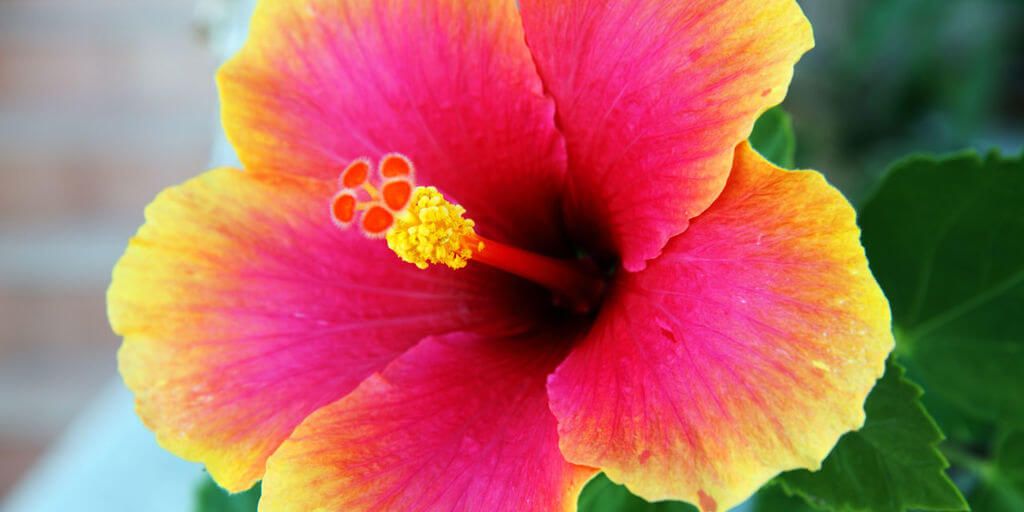Hibiscus (Hibiscus rosa-sinensis), also known as Rose Mallow, is an attractive flower native to subtropic and tropical climates all over the world. Its petals are used to make hibiscus tea, a beverage which has been consumed in many different regions for centuries, including West Africa, Persia, Mexico, Ghana, Cambodia and Egypt.
Hibiscus is recognised in many cultures as a medicinal plant, and is used to treat colds and improve skin health, amongst many other applications.
Hibiscus Can Reduce Blood Pressure
The American Heart Association published a report in 2008 stating that hibiscus tea can lower blood pressure in adults with mild hypertension (high blood pressure). This is as a result of the flower’s anti-inflammatory and cardio-protective properties.
The study showed that the tea could reduce systolic blood pressure by up to 7.2 points, but in order to achieve these impressive results it is recommended to drink three cups each day for at least a six weeks.[1]
Firm, Smooth And Protect Skin With Hibiscus
Hibiscus is rich in Vitamin C and very nourishing for the skin, which is why it has been used for centuries as a natural beauty product. It has powerful firming effects and is often used to as a natural anti-aging solution, since it can smooth out wrinkles and make skin appear fresh and youthful.
Hibiscus is both moisturising and astringent, and this combination makes it suitable for treating skin conditions like eczema and rashes, or for improving scalp health in those with very dry or very oily hair.[2]
It has also been found that hibiscus is able to absorb ultraviolet rays, which is another reason it makes a fantastic skincare ingredient. Exposure to the sun’s UV rays can cause premature aging of the skin and melanoma, so any extra protection a beauty product can offer the skin is always beneficial.[3]
Hibiscus Can Reduce Kidney Problems
Since hibiscus is a natural diuretic, it is often consumed by people with kidney disease, which causes the kidneys to struggle to regulate water. By drinking hibiscus tea regularly, sufferers can increase the frequency of urination in order to remove built-up toxins and waste products from their system, and reduce the discomfort associated with fluid retention.
Hibiscus Can Restore Normal Menstrual Cycle
Hibiscus has shown signs off having emmenagogue effects, which means it can stimulate bleeding in the pelvic region. In women who experience many irregular or missed periods, hibiscus tea can therefore help to normalise the menstruation cycle. For this reason, it is advisable to avoid hibiscus tea during pregnancy, as there is a risk that it could cause miscarriage.
Hibiscus To Treat Skin Cancer
Although there is still more research required, early studies have found that hibiscus could be a successful treatment for melanoma. An active compound found in hibiscus called gossypin was found to inhibit the activity of two gene mutations – BRAFV600E kinase and CDK4 – which are the most common type of mutations in melanoma patients.
Experiments showed that gossypin successfully stopped the growth of melanoma cells which had these two gene mutations. Researchers are hopeful that the findings of these studies may lead to a new type of treatment for melanoma, which is currently one of the hardest forms of cancer to treat.[4]
Relieve Constipation with Hibiscus
Since it has soothing and toning effects, hibiscus can help to stimulate intestinal muscles and make bowel movements more regular. One to two cups of hibiscus tea each day can be incredibly beneficial to those who regularly suffer from constipation.[5]
Fight Off Colds With Hibiscus
The high levels of vitamin C in hibiscus make it a popular remedy for the common cold. For those already suffering a cold, hibiscus tea makes for a refreshing and comforting hot drink which can relieve symptoms, but it’s also a great way to give the immune system a boost and keep colds at bay.[6]
Lose Weight With Hibiscus
A 2014 study by the Food & Function Journal found that hibiscus could aid weight loss. Obese patients who took a tablet containing hibiscus extract for 12 weeks showed a slight reduction in weight, body fat percentage and waist circumference.
Although not a miracle weight loss solution by itself, the study showed that it could be an excellent aid for controlling weight loss when consumed as part of a healthy diet and exercise regime.[7]
Shopping
| Visit the new SHOPPING page for a wide selection of great products! |
References
- http://www.ars.usda.gov/is/pr/2008/081110.htm
- http://www.examiner.com/article/hibiscus-for-beautiful-skin-hair
- https://www.researchgate.net/publication/289615894Studyonanti-solaractivityofethanolicextractofflowerofHibiscusrosa-sinensis_Linn
- https://www.healthstatus.com/health_blog/cancer-2/hibiscus-fights-melanoma/
- http://medlicker.com/814-home-and-herbal-remedies-for-constipation#hibiscus
- http://www.secretsforextraordinaryhealth.com/amazing-natural-cold-remedy-in-hibiscus-tea/
- http://www.foxnews.com/health/2014/08/27/hibiscus-may-enhance-weight-control.html
Always take care when taking herbs and Read Our Disclaimer.
Hibiscus Herb Notes / Side Effects
Hibiscus, commonly consumed as tea or used in supplements, is generally safe for most people. It is beneficial for many health conditions but should be consumed with caution, particularly by those with low blood pressure, diabetes, pregnant women or those on certain medications.
However, consuming it in large amounts or under certain conditions can lead to some side effects.
Here’s a summary of potential side effects:
Blood Pressure: Hibiscus can lower blood pressure. While beneficial for those with high blood pressure, it may cause hypotension (abnormally low blood pressure) in others.
Hypoglycemia: Hibiscus may lower blood sugar levels, which can be an issue for people with diabetes or those taking medications that affect blood sugar.
Hepatotoxicity: High doses of hibiscus extracts have been linked to liver damage in some animal studies. While this is not well-documented in humans, caution is advised with long-term or high-dose use.
Allergic Reactions: Some individuals may experience allergic reactions such as itching, hives, or dermatitis.
Respiratory Issues: Rarely, some people might experience respiratory allergies, including sneezing or wheezing.
Pregnancy: Hibiscus is not recommended during pregnancy as it can stimulate menstruation or lead to uterine contractions, potentially increasing the risk of miscarriage.
Fertility: There are concerns that hibiscus might affect estrogen levels, which could impact fertility.
Drug Interactions: Hibiscus can interact with certain medications, including those for hypertension, diabetes, and cancer. It may enhance or diminish the effects of these medications.
Stomach Upset: Some individuals may experience mild digestive issues like stomach cramps, gas, or diarrhea.
Latin Name
Hibiscus rosa-sinensis
Common Names
Rose mallow, Shoeblackplant, Chinese hibiscus, Hawaiian hibiscus, Swamp rose mallow, Rose of Sharon, Marshmallow, African rosemallow, Hardy hibiscus, Confederate rose.
Properties Of Hibiscus
Emmenagogue, anti-inflammatory, cardio-protective, antioxidant, stimulates intestinal muscles, anti-cancer, diuretic, hypertensive, moisturising, astringent.
Hibiscus Is Indicated For:
Skin cancer, skin health, fighting colds, weight loss, constipation, menstrual problems, kidney issues, reduce blood pressure, detox, fluid retention.



Leave a Reply